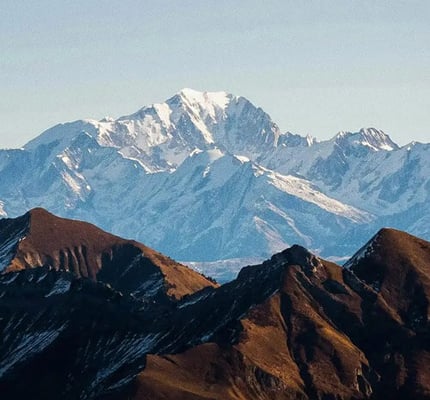Lightfoot Travel
WhatsApp Business Account
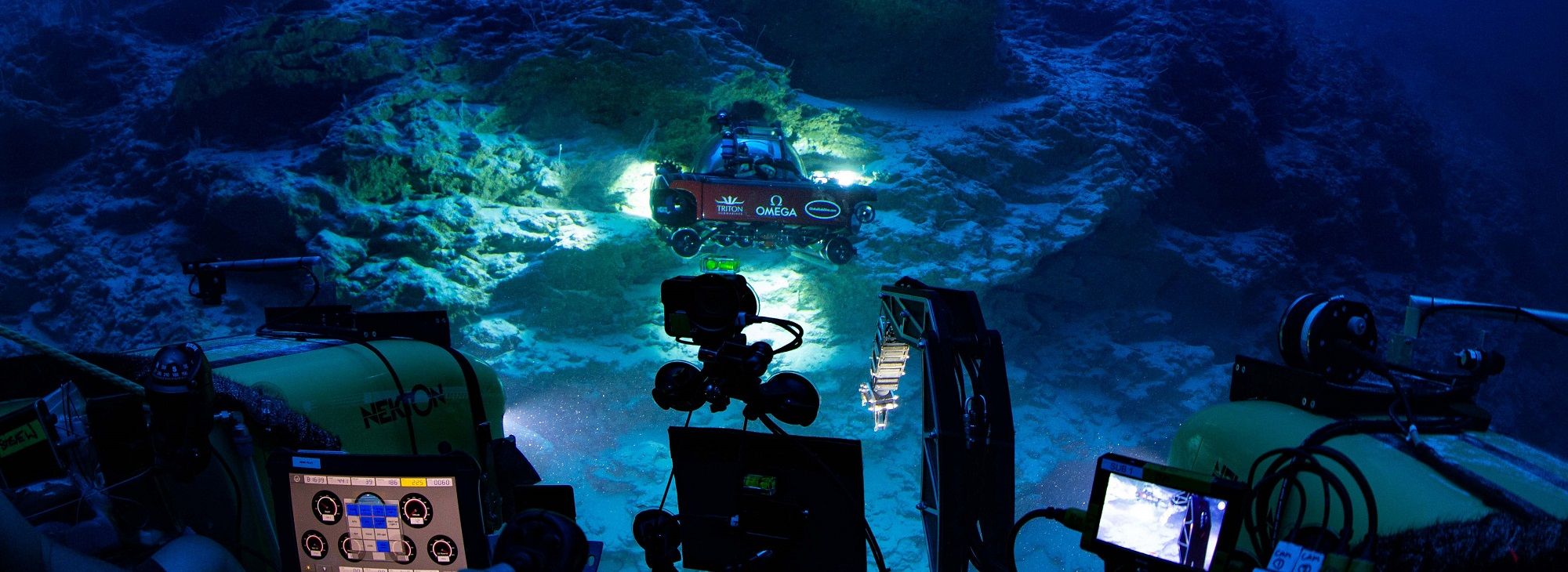
Aquanaut Oliver Steeds has already discovered a new underwater ecosystem in Bermuda. Now he is exploring the depths of the Maldives
Not all workdays start the same way. While you may be brewing your coffee or scrolling through your emails, aquanaut Oliver Steeds is watching a ray scratch its belly on the top of his submersible, hundreds of metres below the waves.
In 2012, Oliver Steeds OBE founded thenon-profit research foundation Nekton,which seeks to protect the ocean. Since its creation, the team of scientists have already discovered a new ecosystem called the rariphotic zone, which is one of the largest ecosystems found in decades.
Nekton’s work has taken its team of scientists and documentary makers, all over the world, including Bermuda, Mozambique andSouth Africa.Now the team is in the middle of a three-year-long project on the Indian Ocean. After studying the underwater landscape of Seychelles, they are now exploring the depths of the Maldives.
“The Indian Ocean is the least protected and least known ocean,” Steeds said. “By 2050, half of the world’s population will be living in and around it.”
Nekton works with the governments of each country to map the ocean floor to gather data that can be used the help establish marine protected areas. Local scientists join them on each underwater expedition to make sure the team is meeting the needs of the nations where they are working. The goal of the Maldives project is to supply data for the Western Indian Ocean Resilience and Prosperity Initiative, which will be the first regional ocean policy and strategy to cover the entire western Indian ocean.
Nekton’s work takes place in the rariphotic zone, which is found between 130 to 300 metres, and the twilight zone, which can be found at 1,000 metres. This zone, which has very little light is still impacted by human beings, due to heat, fishing and pollutants. “The twilight zone is critical for oxygen production, carbon cycling, and regulating climate,” Steeds said.
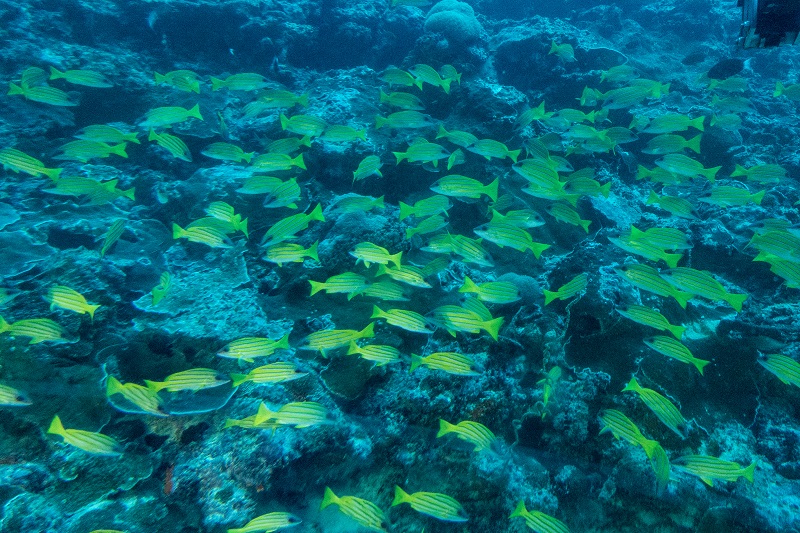
Steeds’ mission to protect the ocean began off the coast of Scotland. The investigative reporter who worked for Channel 4’s Dispatches, NBC, ABC and Al Jazeera, was given what he viewed as a gentle assignment, to report on a new marine reserve, but the dive was about to change his life.
After he disappeared under the waves, Steeds said he found a lush seaweed forest bustling with little critters, fish and scallops. But where the marine reserve stopped, so did the life as Steeds explained that trawler nets outside of the reserve had removed everything in their wake. “You see a wasteland, devastation, a desert… but then behind you see what the ocean could look like,” Steeds said. “That was so startling, it was terrifying.”
This shocking contrast became the catalyst for the launch of Nekton. “The ocean is the largest carbon store on our planet, and yet, it is the least known part of our planet and the least protected,” he said.
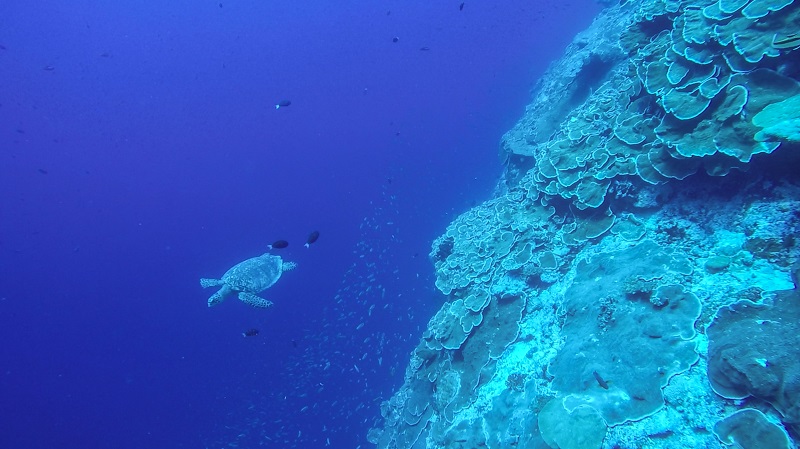
In Seychelles, the team was at sea for nearly 50 days. With the Maldives expedition Steeds and his crew mates will be living aboard the Odyssey ship for the next 35 days.
The team, who start work each day at 6 am, can spend up to eight hours at a time in the submersibles underwater, as they try to maximise every minute at sea. But these minutes are filled with scenes that most of us can only dream of. In Bermuda, the ray sat on top of the submersible to scratch its belly on top. Groupers have been known to swim up to the glass to look at the aquanauts, while sharks and other big megafauna will also swim by the submersibles to give them a once over.
To help them map the ocean floor, they have a multibeam sonar mounted on the ship. Then they have an array of James Bond-worthy gadgets to help them collect the data. On the submersibles, they are able to take water samples with bottles that open at different depths and they also have the ability to measure the biomass through the water with nature technology. When the team sleep, the BRUVS, which are baited remote underwater video vehicles can document what is on the seabed.
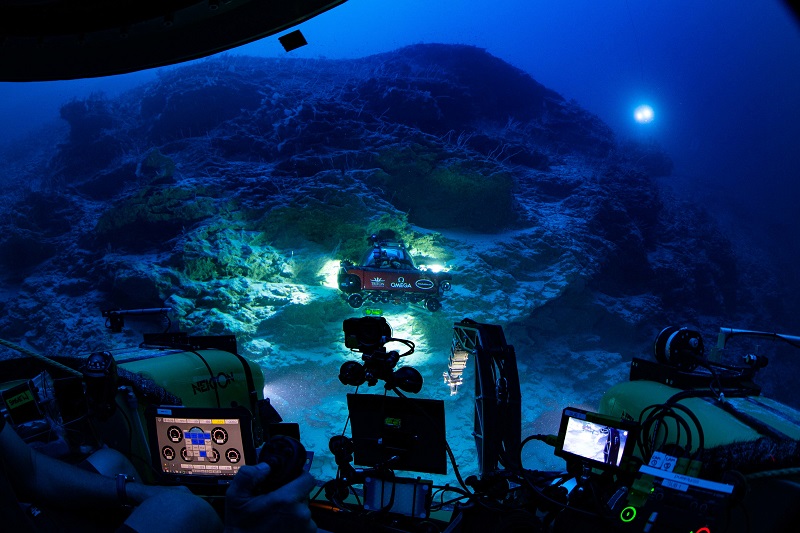
As 90 per cent of the sea creatures in the deep sea are bioluminescent, when the Nekton team strobes the water around the submersibles, it is treated to a light show that could leave any Las Vegas production in the shade. “We’ve seen places where you can park up your sub at 500 metres where there are fish swimming along what is essentially a river and if you strobe the river, it looks like sea stars swimming over a waterfall,” said the aquanaut. “They are extraordinary things to witness.”
Each day, the aquanauts get a front-row seat to migrati with a difference. “At dusk, you have the vertical migration when the animals from the deep rise to the surface to feed and then descend at dawn to the safety of the depths once more,” Steeds said. “If you are in the ocean at night at depth, and you’re in the area of upwelling, you will see an extraordinary amount of animals rising from the deep.”
Steed's most memorable day in the ocean, was when he piloted a sub onto the top of an underwater sea volcano off the mainland of Bermuda with scientist Alex Rogers in the other submersible. “The seamount was teaming with life,” Steeds said. “It was like discovering a new forest, no one knew it was there.” This dive became one of the discoveries that led to the confirmation of the rariphotic zone. In Bermuda, they discovered 100 species, including corals, fish and algae.
Now they are in the Maldives, they are about to dive into waters where Steeds said there is very little data past 20 metres. The submersibles, which look like inverted fishbowls, give the scientists the chance to observe the seabed up close. With each journey down, they want to know what lives there, whether is there a key nursery and find out how healthy the water is.
“The ocean has an amazing ability to ensure its resilience,” Steeds said. “We have only discovered a tiny amount of the species in the ocean and have sequenced even less of them. We need to protect as much of the ocean as we can.”
EXPLORE THE REEFS OF THE MALDIVES
Vakkaru
Oliver Steeds was a visiting expert at Vakkaru in the Maldives. You can now enjoy an underwater experience with the resort’s resident marine biologist Diana Vergara. You can join Vergara for a guided snorkelling or diving trip around the house reef. And you also have the opportunity to adopt a coral frame and place it in their underwater coral nursery.
Alila Kothaifaru Maldives
Explore the hotel’s house reef or enjoy an excursion to Hanifaru Bay, a UNESCO World Biosphere Reserve. Manta rays and whale sharks are known to flock to its waters to feed on plankton.
Six Senses Kanuhara
Opening in December 2022, this three-island resort is found in the Lhaviyani Atoll, which has 40 dive sites. Guests will be able to find out more about ocean conservation at the eco-chic hotel through a host of marine experiences.
Galapagos IslandsEcuador & Galapagos
